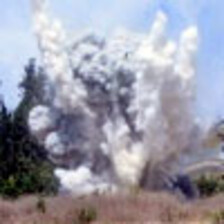Lebanon 6 November 2006
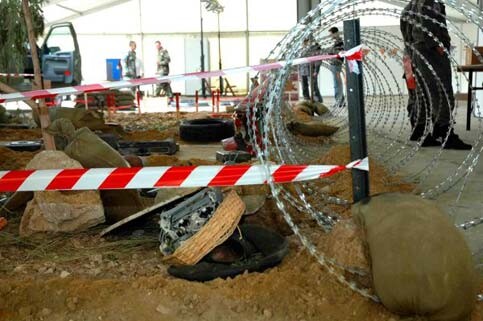
A display of a cluster bomb at an exhibition hosted by NGOs in Beirut to educate about cluster bombs. (Elsee Haddad)
When it comes to cluster bombs, rain was again an issue; a big tent was put up in Martyr s square in downtown Beirut to host the event to avoid the pouring sky. Many NGOs, local and international, gathered to raise awareness about this indiscriminate weapon and to voice a demand for a ban on its manufacturing, distribution and usage. School children and adults toured the multiple sections of the event, an extensive photo exhibit revealing the perilous impact of these weapons in Southern Lebanon; a booth and area where specialists illustrated the stages in constructing prosthetics and artificial limbs, and where the public could also try them along with wheel chairs; a puppet show for children raising awareness amongst the children; a musical concert by handicapped children; a re-production of a contaminated zone and a display of the different types of cluster munitions coupled with demining demonstrations; an exhibit of products and crafts made by Lebanese victims of landmines. The event included signing a petition against the production, trade, stockpiling, and use of cluster munitions.
The day was intense and very charged especially around the center of the tent where a re-production of a contaminated field was displayed. The display included a small tree branch with a cluster bomb hanging from it - a fraction of a scene reminding of more than a million unexploded munitions scattered around the south of Lebanon. A double crime according to Ms. Karine Gavand, Handicap International (HI) Project Manager for the National Day Against Cluster Munition. “They have to be banned, cluster munitions are a double crime. First during the conflict where they cover wide areas mostly civilian ones; and later after the ceasefire where they continue to kill civilians and have serious impacts not only on civilian lives but also high social and economical ones. Farmers cannot reach their fields, and they will not be able to plant the next year s harvest. The scary thing is that a lot of people in the south live from agriculture and they need to go back, even if they are aware of the danger. If they cannot eat they will go even if it means risking their lives since for some it is the only income not just for this year, but for the year to come.”
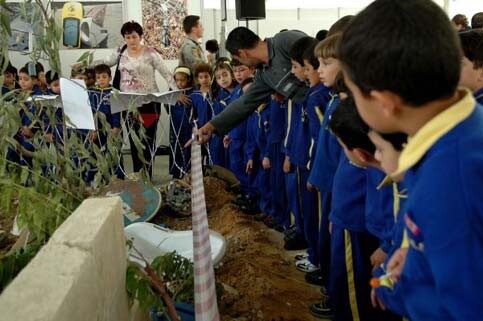
Children observe display of a cluster bomb at an exhibition hosted by NGOs in Beirut to educate about cluster bombs. (Elsee Haddad)
HI Director of Mobilization and Political Action, Mr. Jean Marc Boivin, said ” we found out that 98% of the victims of cluster munitions are civilians with a third of that under the age of 18. Since the cease fire on August 14th, we have 158 civilian victims with twenty dead. Cluster bombs are a serious problem that can go on for years.” Mr. Boivin is working through HI alongside a wide range of international bodies to push for a ban on cluster munitions, something he said he is not willing to compromise. “We have to ban them, they are indiscriminate and their deadly effect can continue for years. Everyone should be pushing their governments to put a ban on such weapons. We get all kinds of excuses from governments against banning them, they are all unacceptable. Belgium is a good example - though the only one; a ban on cluster munitions came in action in Belgium despite the strong lobby of factories making them and businesses benefiting from the distribution. In France we managed to collect 300,000 signatures demanding the ban, and we called presidential candidates to ask them what position would they take in case they won. They all said they would support a ban except for candidate Nicolas Sarkozy.”
Ms. Gavand said that cluster munitions continue to be a problem in countries like Afghanistan, Iraq, and Kosovo - to name a few, and even in Laos more than 30 years after their usage by US forces. Usually cluster munitions have a failure rate between 5 and 30 % but in Lebanon it was as high as 40. Ms. Gavand linked this among other reasons to Lebanese soil since the softer the soil is the less the chances are for these bombs to explode immediately. She also spoke of the way they were used by Israel by being launched too low adding “we do not know if this was intentional or not, but it must have contributed to the high failure rate.” She also spoke of Israel using outdated bombs going as back as the seventies, something supported by multiple reports from international investigations of the contaminated areas, and visible in the photos of the cluster-bomb shells in the exhibition in Beirut. She expressed deep concern over the rain season; “marked contaminated areas will be wiped out by the rain affecting all the mapping done, and cluster munitions will be moved from place, let alone be covered by mud and hidden away. All this will make cleaning the areas much harder adding to a lengthy, costly and slow process - all of which will have serious impacts on civilians in the area. The rain most probably will affect the agreed upon due-date for finishing the cleaning which is set for the end of 2007.”
Mr. Boivin stressed all through the interview on the urgency of banning such weapons; he mentioned scary stocks of sub-munitions worldwide going as high as 800 million bomblets only with the USA. He spoke of the international network working for a ban on cluster bombs, and especially in Europe. Yet these efforts, according to Mr. Boivine, are faced with a strong lobby of arms manufacturers supported by various governments, some of which still did not sign the Ottawa treaty banning landmines. He extended responsibility to businesses investing in factories of cluster bombs, and gave an example AXA, a worldwide banking and insurance group which was found to be investing in companies such as Textron and ATK who are known to be manufacturing these indiscriminate weapons.
Victims of cluster munitions in Lebanon, according to Ms. Gavand, do not only suffer serious injuries such as amputations, but also suffer shrapnels all over their bodies - a nightmare made clear in the photos displayed through out the event courtesy of the Norwegian People s Aid. Photos that showed boxes piled with cluster bombs, contaminated fields with sheep and shepherds walking around, amputated victims, children with shrapnels going as deep as their lungs, cluster bombs in house vicinities, and even a bloodied stretcher used to transport an injured civilian. The images are so strong that no words can describe them, yet this is only a still reproduction of a much more horrid reality.
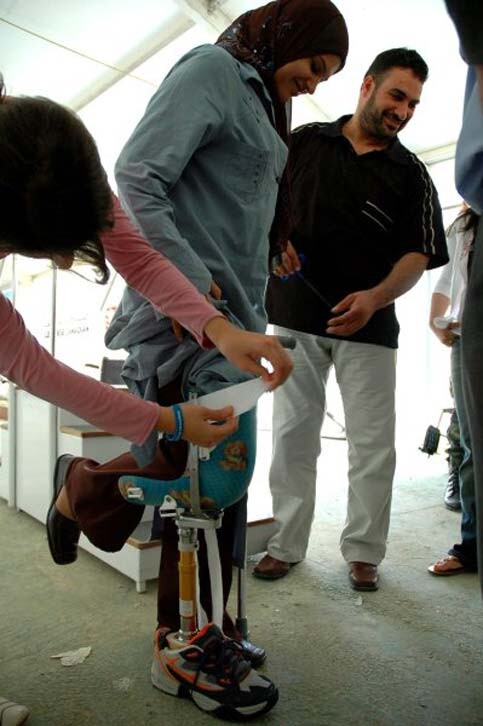
Attendees tried on prosthetics at an exhibition hosted by NGOs in Beirut to educate about cluster bombs. (Elsee Haddad)
I spoke to Mr. Imad Khoshman from Al-Jarha Foundation, himself a victim of Israeli war on Lebanon in 1986 leaving him with an amputated leg. Al-Jarha Foundation (Al-Jarha translates into the injured) takes care of victims of the Israeli war on Lebanon from physical rehabilitation to vocational training among other concerns. Mr. Khoshman, also an activist for handicapped rights in Lebanon and participant in many national platforms for this plight, spoke of the lack of attention from the Lebanese government towards the handicapped. “We have noticed that their priorities do not include our rights despite them being inherent and urgent” said Mr. Khoshman, “we have been pushing for the application of law 220/2000 that secure a step towards equality and integration for the handicapped whether war victims or not since 2000, yet unfortunately the government only complied with the littlest of the little.” Mr. Khoshman stressed the importance of raising awareness around cluster bombs, and also the urgency of the clearance. He said “I urge the international community not only to ban cluster munitions, but to extend financial and professional aid to the Lebanese government and the NGOs working on the issue. Also I urge the Lebanese government and the international community to give attention to the plight of the handicapped, and bear responsibility of the victims of cluster munitions and war.”
The event in Beirut is hoped to be a launch for many to come in various Lebanese areas in an attempt to raise awareness around the issue of cluster munitions in a hope to undermine to a certain extent the associated risks. But will it be enough to save the lives and the welfare of the people is the big question. It definitely will with the visible bomblets, but there lies the danger of the hidden ones, those tucked under stones or covered with mud. Ms. Gavand said that though she saw quite a lot of pictures of clusters before heading to the south on a field trip, it still took her few minutes to visually locate one tucked away in dry branches though it was pointed out to her by one of the demining experts. Those few minutes that are more than enough to cost a person her or his life are another call for a total ban on this weapon. Awareness is indispensable and life-saving but is not enough - as much as demining and cleaning the contaminated areas are vital and a matter of life or death - yet it is still possible for some bomblets to escape expert hands especially with factors such as rain and the wide spread of the bomblets. This is what renders a ban on cluster bombs the most efficient way in terminating the danger of such indiscriminate weapons. Everyone I talked to at the event today had one message to the world, “ban it!”. More voices are needed and definitely more action against this outrageous crime. The toll is very high; it has been for a while and the horrid reality is that it will be on the rise for a long time.
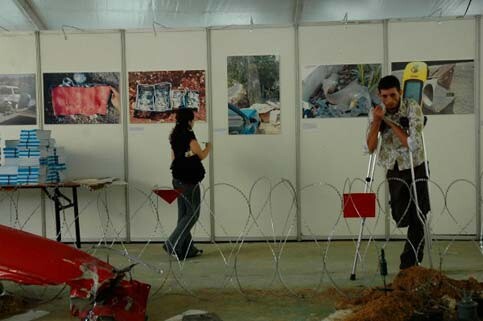
A photo display at an exhibition hosted by NGOs in Beirut to educate about cluster bombs. (Elsee Haddad)
According to the press release, the event in Beirut is also meant to “send a message to the international community prior to the Review Conference of the Convention on Certain Conventional Weapons in Geneva, taking place from November 7 - 17.” A conference according to Mr. Boivin which is not meant to tackle the ban on cluster munitions but rather discuss the post-usage of such weapons which is by no way a solution, yet it poses a good opportunity for NGOs and groups working on the issue to coordinate and call for another international gathering to lay the foundations for a ban on the production, trade, stockpiling, and use of cluster munitions. How long will we have to wait? How high will the price be till the governments of the world reach such an urgent agreement? It is all in their hands, and ours. Act today!
Imad Mortada is a Lebanese anarchist queer activist and Indymedia volunteer based in Barcelona. His writings can currently be read on qursana.blogspot.com
Related Links





